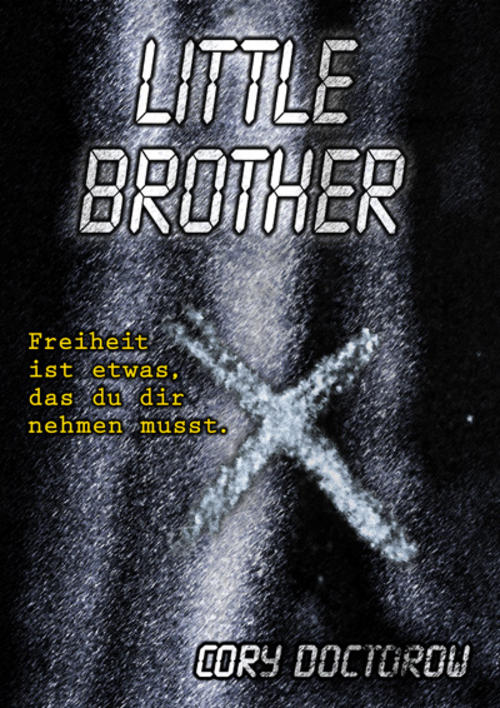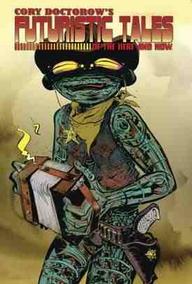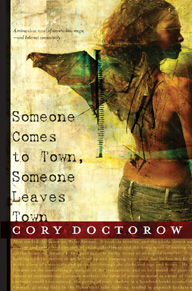News
Here's a Happy Thanksgiving from the New York Times: they've named Little Brother one of the eight "Notable Children’s Books of 2008," calling it, "a novel that is at once an entertaining thriller, a thoughtful polemic and a practical handbook of digital-age self-defense."
Notable Children’s Books of 2008
(Thanks, Lori!)
A reminder that tomorrow is the UK launch and signing for Little Brother at Forbidden Planet in London -- 1PM! You can also pre-order signed copies through the Forbidden Planet site. Hope to see you there!

Saturday 29, November, 1:00PM - 2:00PM
Forbidden Planet London Megastore,
179 Shaftesbury Avenue, London, WC2H 8JR
Our Price: £6.99
Little Brother UK launch/signing at Forbidden Planet London, Nov 29
Damien G Walter's written a smashing profile of me for The Guardian, pegged to the UK release of Little Brother (hope to see you all at the UK launch at Forbidden Planet on Saturday!).
"The job of a science fiction writer, historically, has been to understand how technology and social factors interact," he says, "how technology is changing society. An activist's job is to try to direct that change."
This time his message is aimed at the teenage readers who wear the kind of skater jeans and T-shirt combination Doctorow is sporting today. "If you don't read the Anarchist's Cookbook when you are 16 you have no soul," he says. "If you are still reading it when you are 36 you have no brain." (He himself is 37, but if he's abandoned anarchism, he's clearly not settling into a conservative middle age.)
"My hope is that Little Brother is a verb and not a noun, that it's a thing you do, not just a book you read," he continues. "That's where thinking about the future and influencing the future converge."
Cory Doctorow: willing science fiction into fact
MAKE's put my latest column, "Selectable Output Control," online -- it describes a proposal to the FCC to allow broadcasters to shut down parts of your home theater while you're watching their channels, and the consequences for Makers.
Chances are, you haven't heard of Selectable Output Control (SOC), a proposed digital TV technology that would allow broadcasters or copyright holders to tag their video with a list of receiver-outputs that were allowed to carry it. That's because it's an insane idea.
Picture this: you power up your home theater, an near-incomprehensible tangle of game-consoles, AV switchers, cable boxes, PVRs, DVD players, 5.1 speakers, amps -- maybe a home theater PC or a projector, too. After some fiddling and locating the correct remote, you start to surf up the dial. All good. Then you hit MTV and the gorgeous, perfectly balanced sound stops. Why has it stopped? Because your cable-receiver has received a SOC flag from MTV disallowing high-end audio unless it has some obscure DRM that isn't compatible with any of your gear (especially not your beautiful hand-built tube-amp). MTV doesn't want you digitizing the songs that accompany the (increasingly rare) music videos they play, so if you want sound while watching MTV, you've got to turn on the tiny internal speakers that came with your TV.
You flip up the dial (get up again and turn off the internal speakers), and flip to HBO and your screen goes dark. That's because HBO is showing a movie that has been flagged as "no analog" -- which means that your beautiful, 42" plasma display won't work because you connected it via the composite analog video cables coming off the back of your AV switcher, rather than via the DRM-locked HDCP output. To watch the movie, you'll need to move the entire shelving unit (remember to take down the family photos first, doofus, otherwise you risk shattering the glass if they tip over), disconnect the analog cables, find the HDCP cable that came with the TV (or was it the cable box?) in the garage, and rewire your set. When the kids want to play a couple hours of Paper Mario on the Wii, you're going to need to move it again and reconnect things. (Coming soon to a Make issue: HOWTO put your home theater on wheels for easy rewiring).
Selectable Output Control

Christian Wohrl undertook a German fan-translation of my novel Little Brother, working on his daily train-commute. He's just finished the work and posted "version 1" on his site. The whole text is CC licensed, of course!
"Little Brother" auf Deutsch
(Thanks, Christian!)
My Locus column, Why I Copyfight has been translated into Russian by Private Reporter magazine!
Почему вообще имеет смысл говорить о реформе защиты авторских прав? Что на кону?
Всё.
До последнего времени вопросы авторского права относились исключительно к сфере промышленности. Если вы попадали под юрисдикцию закона о копирайте, это означало использование особых технических средств — печатного станка, кинокамеры, копира. Имела значение и стоимость этой аппаратуры: если что, вы просто добавляли от себя пару сотен баксов юристу, занимающемуся авторскими правами, и проблема решалась. Затраты на весь бизнес при этом увеличивались на пару процентов, не больше.
Когда непроизводственные субъекты (например, обычные люди, школы, группы прихожан и т.п.) имели дело с работами, защищенными авторским правом, не происходило ничего противозаконного: они читали книги, слушали музыку, пели под фортепиано или смотрели фильмы. Они все это обсуждали. Напевали в душе. Пересказывали (с вариациями) детям в качестве сказок на ночь. Цитировали. Разрисовывали стены в детских по мотивам этих сюжетов.
Почему я борюсь с копирайтом?
The launch for the UK edition of my novel Little Brother has been scheduled! I'll be signing at Forbidden Planet in London on Satuday, November 29. They're also taking pre-orders for signed copies by mail-order -- makes a dandy Christmas pressie!

Cory Doctorow – Little Brother
Saturday 29, November, 1:00PM - 2:00PM
Forbidden Planet London Megastore,
179 Shaftesbury Avenue, London, WC2H 8JR
Our Price: £6.99
Pre-order signed Little Brothers from Forbidden Planet,
Little Brother signing at Forbidden Planet
Smári McCarthy, a high-school teacher in Iceland, has been teaching a course unit on civil liberties and technological literacy based around my novel Little Brother. He's launched a new Google Group for the kids in his class (and other classes around the world) to continue the discussion -- what an awesome idea!
At the end of the last class yesterday the idea came up to form a
mailing list for young people who're interested in digital freedoms,
computer security and so on, and one of the students suggested that we
call the list "Watching Back". The list is watchingback@googlegroups.com
and almost all the kids who took the course are on it.
It would be great if people running similar courses could get their
students involved on the list, and that teachers and other people who
know something about the subject hang around and help guide the
discussion as mentors.
There's a lot to discuss. A running theme through the course was the
importance of the power of young people to influence the world. I read
from the Declaration of Independence of Cyberspace in the last class,
because it is somewhat prophetic of what is going on:
"You are terrified of your own children, since they are natives in a
world where you will always be immigrants. Because you fear them, you
entrust your bureaucracies with the parental responsibilities you are
too cowardly to confront yourselves."
Throughout the network young people are being empowered to change the
world, they're figuring out the beauty of the hacker culture and the
fight for freedom. In a world where big brother is watching with
increasing scrutiny it is a big relief to know that at least the
children are watching back.
Watching Back
Locus Magazine
Russian translation, Private Reporter
French translation, Eric Moreau
My latest Locus column, "Why I Copyfight," was published a couple weeks back while I was on honeymoon and made quite a stir. It's intended as a concise answer to the question, "Why should we care about the copyright wars, anyway?"
The Internet is a system for efficiently making copies between computers. Whereas a conversation in your kitchen involves mere perturbations of air by noise, the same conversation on the net involves making thousands of copies. Every time you press a key, the keypress is copied several times on your computer, then copied into your modem, then copied onto a series of routers, thence (often) to a server, which may make hundreds of copies both ephemeral and long-term, and then to the other party(ies) to the conversation, where dozens more copies might be made.
Copyright law valorizes copying as a rare and noteworthy event. On the Internet, copying is automatic, massive, instantaneous, free, and constant. Clip a Dilbert cartoon and stick it on your office door and you're not violating copyright. Take a picture of your office door and put it on your homepage so that the same co-workers can see it, and you've violated copyright law, and since copyright law treats copying as such a rarified activity, it assesses penalties that run to the hundreds of thousands of dollars for each act of infringement.
There's a word for all the stuff we do with creative works — all the conversing, retelling, singing, acting out, drawing, and thinking: we call it culture.
Culture's old. It's older than copyright.
Why I Copyfight

|










